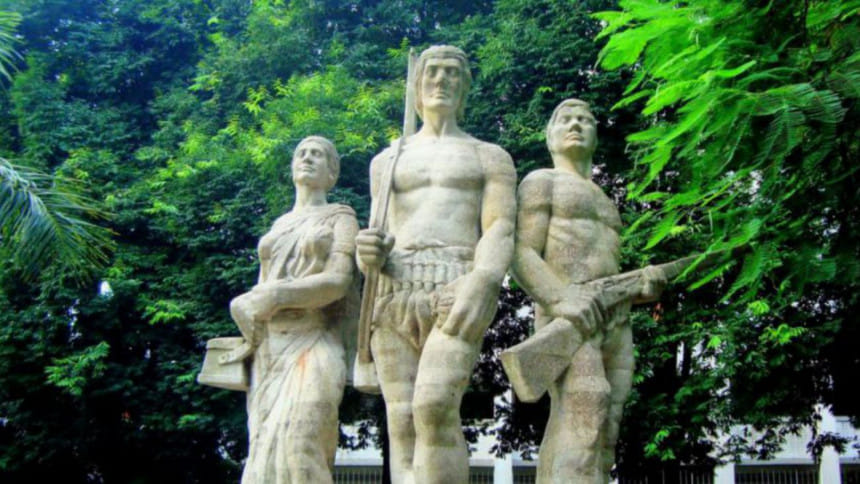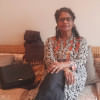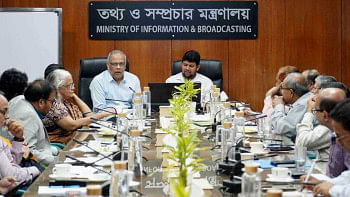Red sun and green earth

When, in March 1971, my eyes first beheld the radiant facsimile of the flag of Bangladesh – the small handprint of my deltaic birthplace, throbbing in the circle of the blood-red sun, safe, snug in the lap of lush green rectangular earth – I was physically a thousand miles away from my beloved motherland. Spiritually, I was in limbo, in a state of stasis, unable to split the dawn with jubilant shouts of 'Joy Bangla', whispering the words of nationalistic glory in private ceremony, sheltered from the seething disbelief and collective humiliation of the vanquished. In solitary spaces, in moments of thoughtful communion with my own people, my psyche resonated to the remembered rhythm of the dhol and my heart lay palpitating in the bower of delicate petals of the red hibiscus, roktokorobi. I stood tall and proud. Fearless and independent.
Encircled, as I was then, by tall fair-skinned Punjabis, I was the proverbial outsider, the 'other'; a petite, precocious, dark-brown seventeen-year-old scholar among classmates whose ignorance of my race and culture was often ridiculously comedic, or sadistically racist and offensive, depending on the nature of the commentary or query directed at me. Most often, I would quietly contemplate the rows and rows of dusty volumes in the spacious, silent library of the college, comfortable in dialogue with the enlightening pages in my chosen place of refuge, away from the negativity and the narrow-mindedness of the boorish and the prejudicial.
Forty-six years on, the seventeen-year-old is celebrating her forty-third Independence Day in her motherland, having been repatriated from the camps in Pakistan in December 1973. The long months of waiting were one of preparation for my life here. I have learnt to see an individual's life as a chiaroscuro, a portrait in shades of light and dark. It is as complex and enigmatic as a Picasso Cubist painting; the arc of one's personal journey cuts across the radius of the circle as it draws a perpendicular line along the vertical and the horizontal axes of the rectangle. And it has been so in my own journey, where fate and choice, circumstance and character have made me what I am today. For a long time now, my identity as a strongly vocal and, sometimes of necessity, belligerent Dhakaite has invisibly and inexorably melded with my identity as a graduate of the University of Dhaka. I have lovingly wandered through alien floors and gazed at thick old bound volumes of anthropology and psychology, and have taken quick detours into philosophy and sociology before coming back to my legitimate terrain - literature. Some of us now teaching in my department, and in other departments of my university and distant universities of the world, began our journey together. Classmates and friends and lovers, we spent hours of fun-filled time writing copious notes on reams and reams of paper in that time before the age of the Xerox machine. Learning was fun, being together was fun, and my university was the best in the world for me.
I remember that we lived at a time of such buoyant optimism that joy was visible in our jaunty footsteps on the thoroughfares and avenues of Dhaka. Eyes luminous with the quest for knowledge, we were a loud, merry band traversing the open grounds of the beautiful campus. Future economists, historians, sociologists, and litterateurs, dear friends of mine studying the humanities and the social sciences, we would parade in groups up and down Fuller Road up to BUET, or down from TSC to the Fine Arts Institute for the sensual, visual experience of the latest art exhibitions and mounted displays, and oftentimes, we would sit awhile gazing at the artist breathing life into clay or canvas. Oh, what thrill it was to be alive at that dawn of our time! Creation was alive, and we echoed its creativity.
Sadly, so much of that buoyancy has been flattened, just as hundreds of flowering trees have been ruthlessly and indiscriminately cut down to make room for the haphazard sprawl of buildings on the campus. Sadly, in some spaces, ostentatious and grandiose architecture has eaten way the core precepts of realistic, practical planning necessary for permanent use by both faculty and students. And, sadly, it has not been easy, being a teacher of this university. It has been a sustained struggle to maintain personal integrity and scholastic independence in the climate of overt politicisation of academia. Pathetically declining standards have made me weep many a time, and I have found strength by seeking inspiration in the few glowing faces with whom I would do a delightful dance of dazzling eye contact as I spoke, and our minds joined in a symphony of lucid comprehension. Do I teach? No, I share. I love these select few; they have the facility, they have the insight. They speak my language. I believe the future is theirs to mould, to guard the legacy of the War of Independence. I believe it is not the violent league of students powerfully strutting on campus, but the dedicated few who shall uphold the foundations of our secular democracy.
Today, after thirty-seven years as a teacher and writer, if I have achieved a small success in bestowing upon my students a measure of my own veneration for art, culture and literature, and have planted in their receptive minds a deep respect for the enduring values of courage and integrity, it is because I too had teachers who led me to develop my own moral vision. I believe each individual of a community, within a social structure, needs to develop a secure moral centre, just as a healthy independent nation needs to maintain moral boundaries in all spheres. Today, my attitude towards my students grows more protective, even maternal, as I grow older. The light of intelligence shines forth from their eyes, and I want to embrace them and give them more, do more for them. So much potential only asking for the right kind of guidance, the deservedly adequate support, the truly ethical choice. But, everyday, I feel gagged and bound. How shall I fulfill my responsibility when partisan politics overrules academic achievement? When deserving faculty are cowed by political loyalists of dubious merit flouting educational ethics?
In a poignant short story, Ernest Hemingway cries out for "a clean well-lighted place", and today, I do too. The iconic Hemingway hero lives by the code of "grace under pressure": the Hemingwayesque struggle is against nada, against chaos, nothingness, madness. This must be our struggle too, my alma mater, if we are to survive with honour and leave a legacy of admirable grace under pressure.
Let us hold hands in the circle of blood and unite under the red sun. Let us dance to the thundering salute of the cannons to welcome our Independence Day. Let us meditate in harmony upon the arrival of a new age of progress in the new millennium. Let us celebrate the positive achievements of four decades. Let not strife pull us apart. Let each human life upon this blessed alluvial soil, let all its flora and fauna, and all its rivers, flow.
Only then shall we be truly worthy of our independence. Posterity awaits!
The writer is Professor, Department of English, University of Dhaka.

 For all latest news, follow The Daily Star's Google News channel.
For all latest news, follow The Daily Star's Google News channel. 



Comments